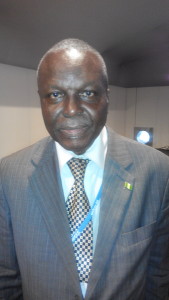The first meeting preparatory to COP 21 in Paris, France ended on Friday in Geneva, Switzerland. There were several issues on the table but this piece is a continuation of our series “The Road from Lima to Paris” and will focus on the structure of the agreement and the way forward from the Geneva meeting.

We must stress that our interest is in pursuance of the Article 6 of the Convention and the resolution from Lima to pursue education and public awareness as mechanism for addressing the challenges and opportunities in climate change. We also want to make it clear that we are all stakeholders in this important global issue of our time. We must all be interested in knowing how the global community is facing this issue and what we can do in our own way to achieve a collective solution to this phenomenon.
The Parties were invited to discuss the structure of the 2015 Agreement in Paris, focussing on what the agreement should do, how it will advance the Convention, whether it will be a “one time agreement” or an agreement evolving through successive sets of commitments, the role of the bodies and mechanism created since COP15, how to address adaptation/mitigation and which issues should be included in the agreement and which one should be addressed through COP decisions.
There were many views that were canvassed. For example, one of the Parties said that the agreement should include objectives, principles and major thematic issues. It also emphasised establishing a link between commitments and compliance, universal participation and considering lessons learned from the Kyoto Protocol for the entry into force of the new agreement.
The views varied from emphasising that the legal nature should not be discussed ahead of agreement on the substance to issues including a section of both mitigation and adaptation to reflect balance and the universal nature of commitments.
The United States was of the view that that the agreement should evolve over time to promote progressively more ambitious action. It also opposed including INDCs in annexes indicating that another format will be appropriate for 195 diverse INDCs.
The EU had preference for legally-binding outcome in the form of a protocol, identifying the need for provisions on entry into force and ratification as well as regional, economic organisations and compliance.
The African Group along with Group 77 + China stressed the importance of distinguishing what will be in the agreement and what will be included in the COP decisions.
In another development, the African Group had the opportunity of sharing the decision of Africa Head of States and Heads of Governments on Africa’s engagements at the UN Climate Summit and Lima Global Climate Change Conference COP20/COP10 on the outcomes of the negotiations. The Report submitted by the Co-ordinator of the Committee of the Heads of State and Government on Climate Change (CAHOSCO), His Excellency Mirisho Kikiwello, President of the Republic of Tanzania. The Heads of States commended the efforts of the Co-ordinator, the African Ministers of Environment, the African Group of Negotiators and others for the common Africa position, the oneness, talking with one voice, active participation including High Level Work Programme on Climate Change Action in Africa-A Blueprint for Climate Action on the Continent.
The road to Paris is definitely long and time is not on our side. We in Nigeria have a great role to play as the continent looks to us to lead the way and ensure that we play the role expected of us.
Paris has an important role to play in the collective vision of humanity to create a better world, move towards the path of low carbon economy, enhance the standard of living of greater number of the citizens of the world and strive for a cleaner environment.
The statement by the French Minister of Finance and Economy, Mr Michael Sapin, could not have come at a better time than now. “Nigeria is an Investors’ unavoidable destination,” he had said.
It is expected that Nigeria would be a major beneficiary of a 240 billion Euro fund being earmarked by France for investment in Africa as part of France’s investment drive on the continent.
We must start the process of engagement now and this involves creating the right environment for sharing knowledge, developing appropriate skills, public-private partnership for growth and development, investing in knowledge and more private sector for addressing climate change and sustainable development that are now development issues.
By Prince Lekan Fadina (Executive Director, Centre for lnvestment, Sustainable Development, Management and Environment (CISME). He is a core Negotiator for Nigeria, member of African Group of Negotiators (AGN) and member, AGN Finance Co-ordination Group)
